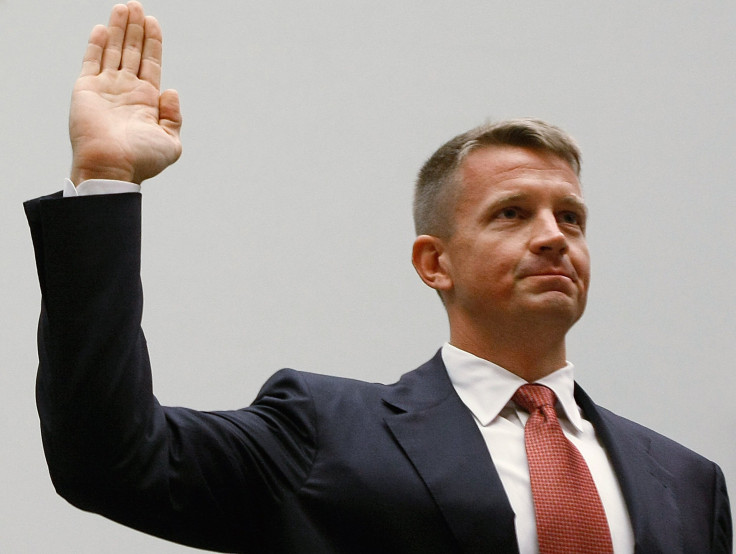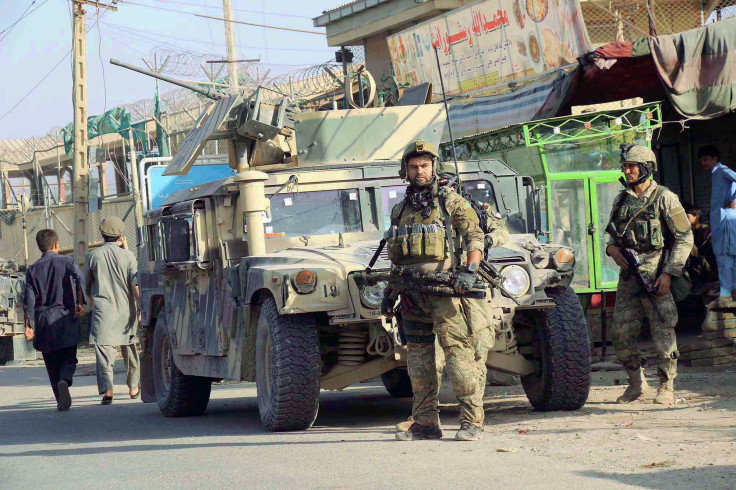Erik Prince’s Afghanistan Plan Could Boost His Company — And China

Blackwater founder Erik Prince, the brother of Education Secretary Betsy DeVos, has been promoting a plan in major media outlets to turn the war in Afghanistan over to private military contractors. But largely missing from the debate about Prince’s plan is that the former Blackwater CEO currently leads a military contractor that would profit from the proposal and enrich its shareholders — which include the Chinese government.
Prince made his pitch to the American people Monday with an op-ed in USA Today and an extended one-on-one interview with host Erin Burnett on CNN.
Both USA Today and CNN named Prince’s current company, Frontier Services Group (FSG) — unlike the Wall Street Journal, which ran a Prince op-ed pushing his plan in May with a one-sentence bio that failed to mention his current position — but neither outlet mentioned that FSG is a security contractor partially owned by the Chinese government.
Erik Prince says McMaster not a fan of his Afghan plan, but Bannon different story - https://t.co/JsanjPsWAn
— Erin Burnett (@ErinBurnett) August 8, 2017
Prince’s proposal is to win the war in Afghanistan through privatization of the military effort there, but it’s also a sales pitch for the services of his industry and his company. FSG has openly allied itself with the foreign policy goals of the Chinese government and has pursued the creation of a private air force — the same type of air force Prince advocates in his plan.
That plan calls for 5,500 private contractors to advise Afghan combat forces. Prince wants to make those private security forces “military employees of the Afghan government,” he explained to CNN host Burnett on Monday. Current Defense Department policy states that private security contractors cannot engage in combat, but can use deadly force in self-defense.
“Imagine them as a skeletal structure that provides leadership, intelligence, medical, communications and logistic support to all those Afghan battalions so it works reliably,” Prince said. He said the security forces that would be used in his plan could be foreign — like his company, which has its headquarters in Hong Kong and is traded on the Hong Kong stock exchange.
The private contractors he wants to deploy to Afghanistan “could be Americans,” he said.
“They could be foreign nationals. They could be NATO allies. They can be from the global SAF community of professionals,” Prince told CNN, using the acronym for Security Assistance Forces (SAF).
The private contractors could potentially be from the company Prince leads. Prince became the chairman of FSG in 2014, and he’s currently its largest shareholder, according to the company’s 2016 annual report. Another substantial shareholder is CITIC Group, a state-owned Chinese conglomerate.
FSG markets itself as a logistics provider in Africa and South Asia, but it also builds military bases, provides “security solutions” in war zones and, according to a report by the Intercept, was, through Prince’s clandestine efforts, trying to build a private air force.
While Prince is a former American servicemember (he was a Navy SEAL), his company is working to help China achieve one of its most important foreign policy goals: the “One Belt One Road” initiative, which is an ambitious plan to link China to Europe through $5 trillion in infrastructure investment in more than 60 countries.

“2016 saw FSG take substantive steps to grow in existing markets as well as aligning our strategy to better serve China’s One Belt One Road development policy,” Prince wrote in his most recent annual letter to shareholders, dated March 22, 2017. Looking forward to 2017, Prince wrote, “we are looking forward to extending our work along the One Belt One Road region. Our aircraft reach can extend air operations, medevac and air cargo on demand through the entire region.”
Afghanistan is a critical part of the One Belt One Road plan, which is why Bloomberg reported last year that China was the number one investor in Afghanistan.
“Without Afghan connectivity, there is no way to connect China with rest of world,” Chinese ambassador to Afghanistan Yao Jing said in a speech given at the completion of a Chinese-built rail route in Afghanistan last year.
Reports have indicated China’s military, which has expansive mineral and oil rights in Afghanistan, is conducting joint operations with Afghan troops inside the country.
Prince “rejects criticism that he and others would profit” from the plan, USA Today reported, instead saying his plan would “represent a cost savings for American taxpayers.” Earlier this year, he told the Financial Times his company was “not serving Chinese foreign policy goals, we’re helping to increase trade.”
The White House is reportedly “considering” Prince’s plan. The proposal does not appear likely to become U.S. strategy anytime soon, although the non-military members of the Donald Trump administration seem especially keen on it. Trump Senior Adviser and son-in-law Jared Kushner, along with chief strategist Steve Bannon, who hosted Prince regularly on his Breitbart radio show, reached out to Prince about the proposal. In July, Bannon presented Prince’s ideas to Defense Secretary Jim Mattis, who decided to leave the plan out of a review of the U.S. military’s policy in Afghanistan, the New York Times reported.
Prince said on CNN that his discussions with White House staff occurred because President Trump read his Wall Street Journal op-ed and wanted to know more. The two have a history (apart from their mutual connection to Betsy DeVos): Prince donated $100,000 to a pro-Trump super PAC last year and met with the president during the transition, according to Bloomberg. The Washington Post reported that Prince tried to establish a Trump-Putin back channel in January, just days before Trump took office.
Erik Prince tells me he met with a Russian "fund manager" over "one beer" in Seychelles. https://t.co/N05WD5rtT3
— Erin Burnett (@ErinBurnett) August 8, 2017
Prince rose to fame after starting and leading Blackwater, the private security force that changed its name — twice — apparently to avoid the negative publicity associated with allegations of misconduct. Those allegations included the conviction of former guards on murder and manslaughter charges in U.S. courts for killing 14 unarmed civilians in Baghdad in 2007, convictions which just last week were tossed by a federal appeals court. Blackwater agreed to pay $42 million in fines to the State Department for export violations, which included illegal weapons exports to Afghanistan. Prince left Blackwater in 2009.
In addition to calling for more private security contractors in Afghanistan, Prince is advocating a 90-plane private air force that would “provide air support... against Taliban insurgents,” USA Today reported. Prince explained his emphasis on air support on CNN Monday.
“[Afghan military forces] need air power. Less than 40 percent of the U.S.-provided air power to the Afghan forces still even functions, because the maintenance and training has been such a failure,” Prince said.
His own company could provide that air power: He recently submitted a business proposal to the Afghan military to set up a private air force, the Military Times reported last week. Prince has been pursuing the idea for some time, according to the Intercept.
The Intercept last year documented the billionaire’s efforts to circumvent laws around exporting weapons by fitting agricultural aircraft with surveillance and weapons technology and sending them to clients in Africa. Austrian company Airborne Technologies, which Prince had a 25 percent stake in at the time, made the modifications, the Intercept reported.
© Copyright IBTimes 2025. All rights reserved.






















